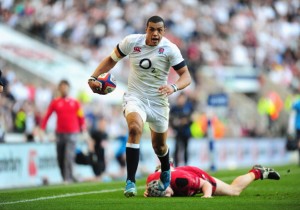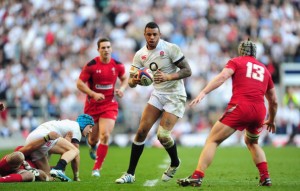By Charlie Morgan
It’s tempting to splurge on hyperbole. On Sunday, England accomplished a revenge mission and drove away the demons that have haunted them over the past 12 months. Some facets of their performance at Twickenham merit exultant praise. Stuart Lancaster’s men kept Wales try-less and were very good value for a 29-18 victory. A first Triple Crown in 11 years will feel extremely sweet.
But an ambitious side shouldn’t stall on their pursuit of improvement prior to Rugby World Cup 2015. Self-congratulation tends to make progress stagnate, so constructive criticism is essential. Here are five points to come from England’s third consecutive triumph.
Psychological blow that could have been
more comprehensive
In the wake of the Ireland triumph, some newspapers announced that Lancaster’s young team had grown up. If that is true, this was the weekend they bought their own pad and moved away from home. By bettering Wales’ physicality, England demonstrated the benefit of that 30-3 mauling at the Millennium Stadium. Lessons have been learned and the significance of a successful dress rehearsal for the Pool A encounter in 2015 cannot be underestimated.
But the biggest positive to emerge was that the hosts should have won by even more. A few poor passes stopped wider runners and a golden opportunity for a lineout drive at the death was ransacked. Luther Burrell was only denied a brace by Leigh Halfpenny’s total disregard for his own body and over-excitement gave Wales an easy route back a couple of times. Following early restarts, England played too much rugby in their own 22 and put themselves in danger.
Dylan Hartley – a strand-out of the entire tournament – will be hugely disappointed by the sloppy penalties he conceded. With Halfpenny around to punish most misdemeanours, avoidable indiscretions such as the one on of the stroke of half-time were misguided. When Gethin Jenkins was sent to the sin bin, England never landed the knockout punch they should have. An avalanche of points is needed in Rome to clinch the Championship – things have to get more clinical.
Wilson and Rowntree redeem themselves
Cian Healy destroyed England’s scrum, leaving Graham Rowntree shell-shocked. Quite right too – losing four out of nine put-ins is a simply disastrous return. For that reason, the first set-piece was ominous on Sunday afternoon. Jenkins out-manoeuvred David Wilson, compelling Romain Poite to award a penalty. Given the Frenchman is notorious for rapid, relentless whistle-blowing in favour of the dominant pack, it didn’t look good.
Wilson turned it around though, eventually forcing Jenkins from the field. As the key communicator with referees during a Test week, Rowntree must take a large amount of credit for ensuring his players were aware of how Poite would referee both the scrum and breakdown. Aside from being shunted backward by Bath clubmate Paul James in the second half, Wilson’s 72-minute shift was outstanding.
‘Proper seven’ debate is done and dusted
At the final whistle, BBC interviewer Sonja McLaughlan asked man-of-the-match Courtney Lawes what the difference was between the England of March 2013 and the current version. Following a simply staggering individual effort, the lock could have justifiably answered with one word: “me.” His athleticism, handling skills and controlled menace have undeniably elevated his status. But Lawes is just one cog in the machine.
England’s pack now has multiple dimensions – off-loading, power and stratospheric fitness. Wales struggled to live with the pace and saw their defensive breakdown nullified. Sam Warburton tried manfully, but he wasn’t able to disrupt and jackal master Justin Tipuric didn’t get a sniff during his brief cameo.
Tom Wood and Chris Robshaw complement each other brilliantly when deployed as flankers and made 28 tackles together as well as all the other graft. If there are still people who think a ‘genuine openside’ is England’s Holy Grail, they are massively mistaken.
Morgan and Twelvetrees stood up to be counted
The void left by Billy Vunipola and his ankle injury earned a lot of air-time ahead of this fixture, many questioning whether a builder’s son from Dursley who used to be too tubby would be able to provide the same impact at No 8. Turns out he could. And then some. For a start, he got through 80 minutes, more than Vunipola has yet done. In that period, Morgan made 15 carries, 13 tackles (without missing one) and two offloads. There were also ten passes, many of which released a secondary runner to stretch Wales – a crucial component of England’s attacking shape.
Billy Twelvetrees has been another to endure this season’s travails at Kingsholm, as well as a certain amount of flak recently. Though there were a couple of loose kicks early on, England’s inside centre responded magnificently overall. Roberts was shackled and distribution seemed quicker, allowing Luther Burrell a more prominent role. Indeed, England’s midfield pair combined fantastically for the second try – Twelevetrees’ grubber inch-perfect for Burrell to dot down.
Lions snubs have spurred England
Anticipation for last summer’s British and Irish Lions tour reached overkill. The practice of selecting potential Test sides grew stale and by the time the first Test arrived, every pundit had suggested about 25 different teams. That said, it’s irresistible to ponder who might wear red if there was a Test against the All Blacks on Saturday. One thing is for sure: there would be a good few Englishmen in contention.
Rejection can be a brilliant motivator, and the likes of Danny Care, Brown, Wood and Robshaw are evidently have desire to prove themselves – although they would never openly admit as much. They didn’t make it to Australia and were desperate to prove they deserve the same recognition as Mike Phillips, Halfpenny, Dan Lydiate and Sam Warburton. Before the Ireland match, Wood explained how much he enjoys “making proven performers look average”. Such spikiness is working out well.
The Western Mail’s argument that just three England players would get into Wales’ 15 might still stand – one loss does not damage the pedigree and experience of Warren Gatland’s individuals. The fact is that England’s collective culture and improving cohesion makes them better than the sum of their parts. Plus they don’t give a damn about make-believe teams anyway. They are living in the here and now.










